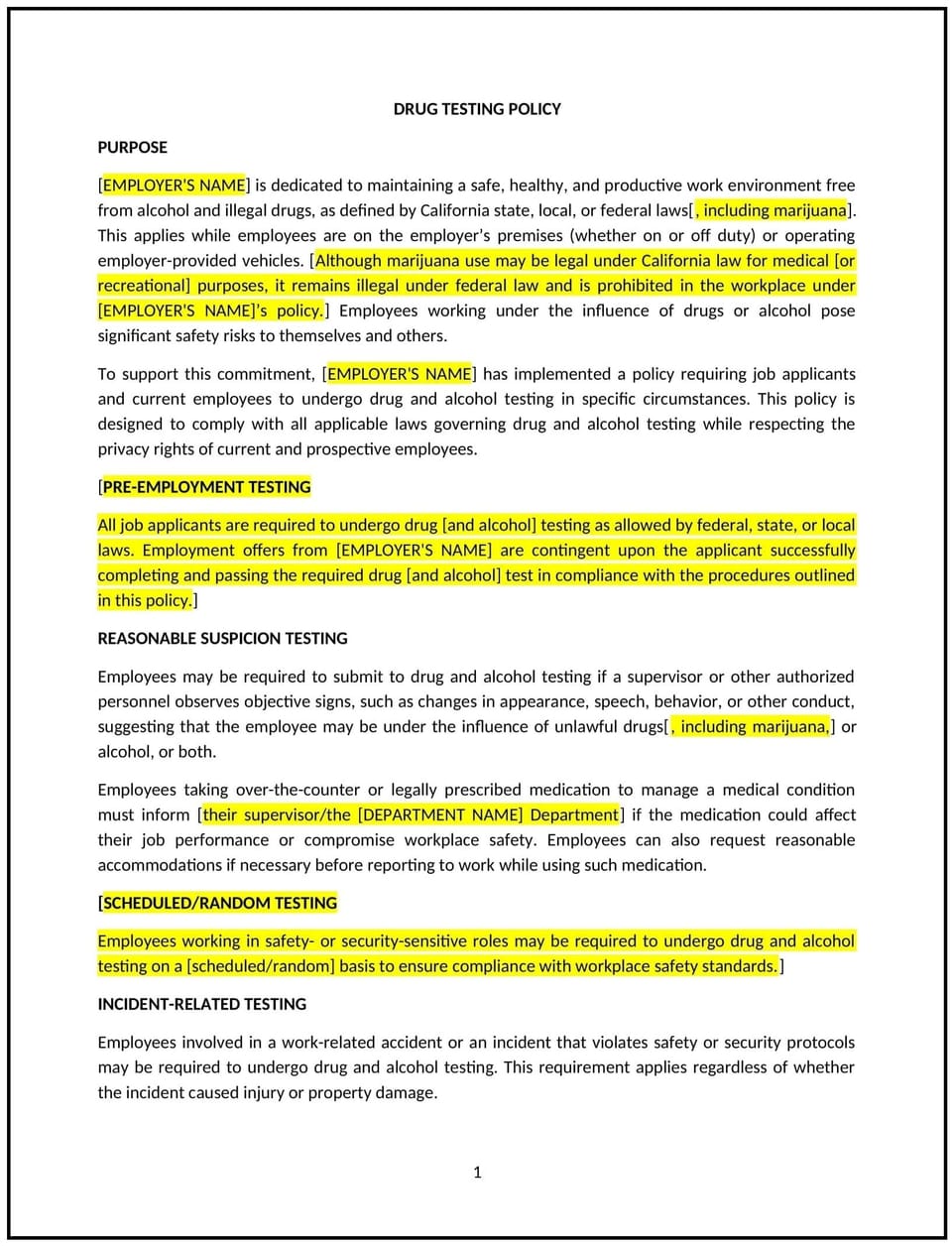Drug testing policy (California): Free template

Drug testing policy (California)
In California, a drug testing policy provides businesses with guidelines for conducting drug tests to promote a safe, productive, and compliant workplace. This policy outlines permissible testing scenarios, employee rights, and the steps the business will take to ensure fairness and privacy, while supporting compliance with California laws, such as privacy protections under the California Constitution.
This policy addresses pre-employment testing, reasonable suspicion testing, and post-incident testing. By implementing this policy, California businesses can manage workplace safety risks effectively while respecting employee rights.
How to use this drug testing policy (California)
- Define testing scenarios: Specify when drug testing may occur, such as pre-employment, reasonable suspicion, or following workplace accidents.
- Ensure compliance: Reflect California laws limiting drug testing, particularly in relation to employee privacy and medical marijuana use.
- Establish procedures: Provide clear instructions for administering tests, including how samples will be collected, analyzed, and reported.
- Communicate rights: Inform employees of their rights, including how results will be handled and the process for disputing findings.
- Apply consistently: Ensure the policy is enforced uniformly to avoid claims of discrimination or unfair treatment.
Benefits of using this drug testing policy (California)
This policy offers several advantages for California businesses:
- Supports compliance: Reflects California laws, including privacy protections and considerations for medical marijuana use.
- Promotes safety: Reduces workplace risks associated with substance use, particularly in safety-sensitive roles.
- Enhances accountability: Provides a structured approach to drug testing that employees and managers can follow.
- Protects privacy: Ensures drug testing practices respect employee confidentiality and legal rights.
- Mitigates risks: Helps the business address substance-related concerns proactively and reduce liability.
Tips for using this drug testing policy (California)
- Reflect California-specific laws: Include restrictions on random drug testing and considerations for medical marijuana use under state law.
- Train managers: Educate supervisors on recognizing reasonable suspicion and handling drug testing requests appropriately.
- Use reputable testing facilities: Partner with certified labs to ensure accurate and reliable results.
- Maintain confidentiality: Handle drug test results securely and limit access to authorized personnel only.
- Review regularly: Update the policy to reflect changes in California laws, workplace practices, or industry standards.
Q: How does this policy benefit the business?
A: This policy supports compliance with California laws, promotes workplace safety, and provides clear guidelines for drug testing.
Q: What types of drug testing are permitted under this policy?
A: Permitted testing includes pre-employment, reasonable suspicion, post-incident, and other scenarios as outlined in the policy and consistent with California law.
Q: How does this policy support compliance with California laws?
A: The policy reflects California’s privacy protections and restrictions on drug testing, supporting lawful and fair practices.
Q: What steps should employees take if they have concerns about drug testing?
A: Employees can raise concerns with HR or management and follow the procedures outlined in the policy for disputes or clarifications.
Q: How can the business ensure drug testing practices are fair and consistent?
A: The business can train managers, use certified labs, and enforce the policy uniformly to avoid bias or unfair treatment.
This article contains general legal information and does not contain legal advice. Cobrief is not a law firm or a substitute for an attorney or law firm. The law is complex and changes often. For legal advice, please ask a lawyer.


